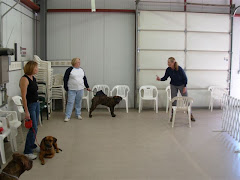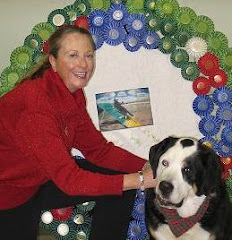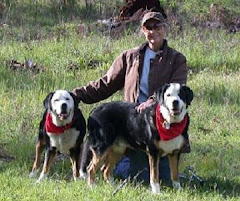"Should I do that?"
Aha....now that's an entirely different question. The answer is a nice, safe, "It depends."See if you can identify with any of the following scenarios.
1. You just adopted a five-year-old dog from the shelter. He spent most of his time in the back yard of a busy young family. Records indicate his name has always been "Toby." You're not crazy about that name because it just doesn't suit his personality. Plus, he doesn't seem to respond well to it. You play around with some other names, bouncing various vowel/consonant combinations off him to see which make his ears perk up. If you find a name that rings your bell and his, should you change it?
Yes...you can certainly consider it. The dog who doesn't respond much to his own name either has a bad association or not much association with it at all. Maybe it's his personality, but chances are it's the way the name has been used during his lifetime. If it doesn't turn him on, and he does respond more positively to a different name, go ahead and change it.One of my nieces announced to her parents when she was 10 years old that she wanted to change her name from Madelaine to Cary. She was so insistent that they obliged her. Forty years later, she has no regrets. For some reason she detested the name Madelaine and simply felt it didn't fit her at all. A new name made a world of difference to her. It could be the same with your dog.
2. You just adopted a five-year-old dog from the shelter. She's spent her whole life with a loving elderly couple who now live in an assisted living center that doesn't allow dogs. Records indicate her name is Sophie, but you hate that name because it reminds you of an old grouchy aunt. You'd really like to change it to Stella. The dog you adopted, however, is a sensitive girl who seems eager to please but somewhat timid. When you say "Sophie," her tail wags and her ears lay back in an expression of soft submission. Should you change her name?
No....this dog has lost everything she ever had except her name. If she responds to it with positive body language, let her keep the name. It will be a great comfort to hear the familiar sound of her own name spoken in a friendly way here at this new home that's probably a bit scary to her. It will help her bond with you.
3. You just adopted a five-year-old dog from the shelter. She's spent a happy life with a young female soldier who's being deployed and can't keep the dog. Records indicate her name is Lulu, but you'd like to change it to "Tula," because you just think it sounds better. Lulu seems to be a pretty well-adjusted dog. Should you change her name?
You can probably swap these names fairly painlessly, since they share the same vowel and number of syllables. In other words, they sort of sound alike already. If you play name games with Lulu, sometimes alternating "Lulu" with "Tula," and then decreasing your use of "Lulu," you can change the name to "Tula" without confusing or offending the dog.My examples have been with adult dogs. Changing a puppy's name is easy, since the old name generally has little or no history behind it. Puppies are extremely adaptable to changing conditions. Do practice saying the contemplated new name out loud, as if you're calling the dog from across a park. Is it easy for you to say when you're excited or agitated? Is it distinguishable from other command commands? "Oakley" is another great name, but it's hard to use "okay" as a release since "Oakley, okay!" sounds kind of confusing. I once knew a dog named "Ono," which made use of the common reprimand "No!" rather awkward. Other tongue twisters I recall from past students were "Epiphany," "Tinkerbelle" and "Thelonius," although the owners used "Piph," "Tink," and "Theo" as call names, which makes perfect sense. One or two syllables are best. Using a combination of contrasting vowel sounds (Angus, Lizzie, etc.) makes the name even easier to distinguish outside at a distance. If you plan to do agility, herding or other performance sports where speed is required, plan to use a one-syllable name or nickname since you might not have time to spit out more than that when your dog is running full-throttle.
When you're contemplating changing your dog's name, take into consideration all of the following:
- Does the dog seem to like his old name?
- Does the dog even care about his old name?
- Has the dog come from a stable environment where the old name was used consistently and positively?



















1 comment:
I agree, the decision should be in the best interest of the dog. I recently adopted a 5 month old Dane who had been with his breeder since birth. She gave me the option to change his call name, but not only did it match his registered name, it was about the only thing familiar he still had, leaving his person and his pack. He quickly settled right in and is a happy member of our family!
Post a Comment